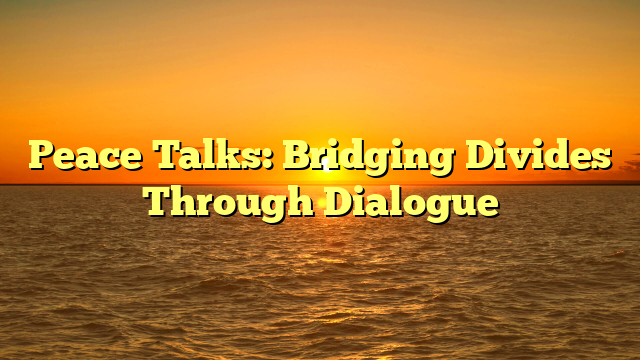Peace Talks
In an ever-changing world rife with battle, the significance of peace talks can’t be overstated. They function very important platforms for dialogue, negotiation, and the rebuilding of belief amongst opposing factions. The hunt for peace is each an artwork and a science, requiring not simply the participation of diplomats and leaders but in addition the engagement of communities and people. This text explores the essence of peace talks, their historic significance, fashionable frameworks, and actionable insights to foster a tradition of dialogue.
The Essence of Peace Talks

Peace talks are structured discussions geared toward resolving conflicts by way of negotiation reasonably than violence. They contain a wide range of stakeholders, together with governments, non-governmental organizations (NGOs), and typically grassroots organizations. The first objective is to bridge divides and create a basis for sustainable peace.
Historical past of Peace Talks
Traditionally, peace talks have performed a pivotal position in resolving conflicts. From the Treaty of Westphalia in 1648, which ended the Thirty Years’ Battle, to the Camp David Accords in 1978, these discussions have laid down blueprints for coexistence. Their profitable outcomes can usually be traced again to key ideas like mutual respect, transparency, and a real willingness to compromise.
Fashionable Day Framework
In the present day, peace negotiations usually happen in complicated environments the place conventional state-to-state negotiations are supplemented by broader participation. Frameworks such because the United Nations’ initiatives have grow to be essential, integrating the voices of civil society, girls, and youth within the peace-building course of.
The Anatomy of Profitable Peace Talks
For peace talks to be efficient, a number of parts have to be in place.
1. Establishing Belief
Belief is foundational. Events have to enter negotiations with an understanding that the method is safe and respectful. Pre-talk workshops can assist construct relationships among the many factions concerned, setting the stage for a extra fruitful alternate.
2. Setting Clear Targets
Each negotiation should have clear, achievable goals. Ambiguity breeds misunderstanding; clear targets mitigate this threat and pave the way in which for measurable outcomes. Stakeholders ought to agree on what profitable peace appears like upfront.
3. Efficient Communication
Communication is essential. Open dialogues that embrace different views create a richer understanding of the complexities concerned within the battle. Using expert mediators can facilitate this course of, guaranteeing all voices are heard and acknowledged.
4. Inclusivity
Inclusivity is crucial in any peace talks. Participating numerous stakeholders, similar to girls, youth, and marginalized communities, enriches the dialogue and displays the society that can in the end reside with the peace settlement. This additionally helps to keep away from the pitfalls of top-down decision-making.
5. Comply with-through Mechanisms
As soon as an settlement is reached, efficient implementation is essential. Mechanisms have to be established to watch adherence to the phrases of the settlement, with specified timelines and penalties for non-compliance.
Case Research: Peace Talks in Motion
The Good Friday Settlement: A Mannequin for Success
The Good Friday Settlement (1998) is famend for its position in bringing peace to Northern Eire. A pivotal function of this settlement was the inclusive method taken by all events concerned, together with politicians from numerous backgrounds and neighborhood leaders. Steady dialogue and dedication to a shared future facilitated a profitable transition from battle to cooperation.
The Colombia Peace Course of: Challenges and Triumphs
Colombia’s peace talks with FARC (Revolutionary Armed Forces of Colombia) offered quite a few challenges, but they showcase the ability of resilience and dialogue in attaining peace. After 4 years of negotiations, the 2016 peace settlement was reached, demonstrating how sustained dialogue, even amid skepticism and opposition, can result in sustainable peace.
Overcoming Obstacles to Dialogue
Whereas the targets of peace talks are sometimes noble, the journey is fraught with challenges. Understanding these obstacles can present insights for future efforts.
1. Mistrust Amongst Events
Lengthy-standing animosities can impede progress. Establishing impartial floor and using third-party mediators can assist construct belief and be certain that dialogue stays productive.
2. Lack of Dedication
Dedication to the peace course of have to be robust. Stakeholders want to have interaction persistently; half-hearted efforts often yield disappointing outcomes. Creating monitoring teams can assist preserve events accountable.
3. Exterior Influences
Exterior actors, whether or not governments or highly effective organizations, usually complicate peace negotiations by having vested pursuits. Their involvement have to be managed rigorously to make sure they don’t derail the method.
Actionable Insights for Fostering Dialogue
Making a tradition of dialogue goes past formal peace talks. Listed below are some actionable insights to advertise understanding and peace in on a regular basis interactions:
1. Domesticate Empathy
Encouraging people to see the world by way of others’ views can considerably bridge divides. Neighborhood-led workshops and dialogues can facilitate this course of.
2. Promote Schooling and Consciousness
Schooling performs a vital position in dismantling stereotypes and fostering understanding. Colleges ought to emphasize the significance of peaceable battle decision by way of curriculum and extracurricular actions.
3. Harness Know-how
In right this moment’s digital age, know-how can function a robust software for dialogue. On-line boards and social media can join folks from numerous backgrounds, fostering discussions and breaking down limitations.
4. Assist Grassroots Actions
Native initiatives usually have the perfect insights into community-specific points. Supporting grassroots organizations can strengthen neighborhood bonds and improve the peace-building course of.
5. Encourage Steady Communication
Dialogue shouldn’t be a one-time occasion. Establishing common neighborhood boards the place ongoing discussions can happen helps to take care of relationships and construct belief over time.
Conclusion: The Path Ahead
Peace talks are instrumental in bridging divides by way of dialogue, fostering understanding, and paving the way in which for sustainable options to battle. As historical past has proven, efficient negotiations comprise important components like belief, clear goals, and inclusivity. By studying from previous successes and challenges, communities and leaders can have interaction in significant dialogue that resonates far past the negotiating desk.
To actively contribute to this dialogue-driven world, people should have interaction in conversations that promote understanding, educate themselves and others, and help initiatives that goal to construct bridges reasonably than partitions. The journey towards peace begins with us—one dialog at a time.



